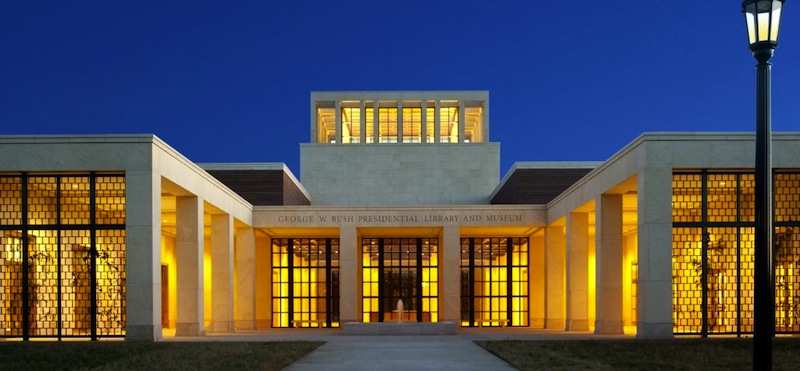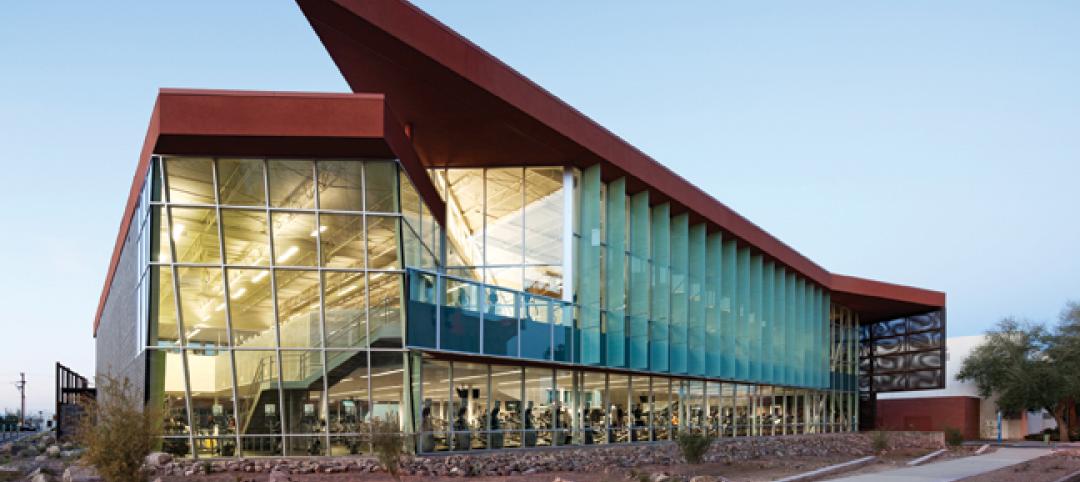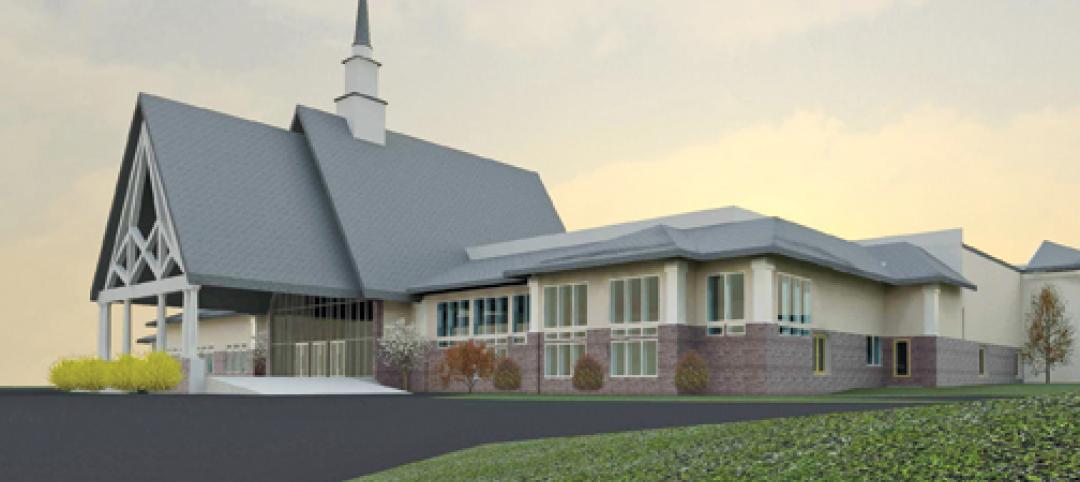The George W. Bush Presidential Center announced today it has earned Platinum certification by the U.S. Green Building Council’s Leadership in Energy and Environmental Design (LEED) program. The Bush Center is the first presidential library to achieve LEED Platinum certification under New Construction (v2009).
“As we approach the Bush Center’s April 25 dedication, we are proud to be recognized for our emphasis on sustainable building design,” said Mark Langdale, President of the George W. Bush Presidential Center. “The Bush Center and our ongoing work are a reflection of the principles that guided President and Mrs. Bush in their public service, including their longstanding commitment to conservation and caring for the land.”
The LEED Green Building Certification System encourages the use of designs, materials and systems that are sustainable, energy efficient and reduce a facility’s impact on the environment and human health. The Bush Center features green roofing systems to reduce heating and cooling demands, solar panels for producing electricity and hot water, building materials sourced from the region to lower transportation impacts, and rainwater recycling that will meet 50 percent of the irrigation needs of the native Texas landscaping.
Regionally sourced building materials used in the Bush Center include Texas Cordova cream limestone from Central Texas, Permian sea coral limestone from near the Bushes’ hometown of Midland, Texas, stained pecan wood interior paneling, and Texas mesquite hardwood floors.
A 15-acre urban park surrounds the Bush Center and allows visitors to experience a distinctive, native Texas landscape in the heart of a major city. The project restored the land’s native habitat by planting more than 70 percent of the site, including more than 900 trees, 40 of which were transplanted from the Bushes’ Prairie Chapel Ranch in Crawford, Texas. The Bush Center’s landscaping includes a prairie and savannah planted with five drought-tolerant grasses, and a wildflower meadow, featuring Texas wildflowers such as bluebonnets.
For more information on the Bush Center’s LEED features, please see the attached fact sheet, or visit the Bush Center online at www.bushcenter.org.
Related Stories
| Nov 9, 2010
Designing a library? Don’t focus on books
How do you design a library when print books are no longer its core business? Turn them into massive study halls. That’s what designers did at the University of Amsterdam, where they transformed the existing 27,000-sf library into a study center—without any visible books. About 2,000 students visit the facility daily and encounter workspaces instead of stacks.
| Nov 9, 2010
Turner Construction report: Green buildings still on the agenda
Green buildings continue to be on the agenda for real estate owners, developers, and corporate owner-occupants, according to the Turner 2010 Green Building Market Barometer. Key findings: Almost 90% of respondents said it was extremely or very likely they would incorporate energy-efficiency improvements in their new construction or renovation project, and 60% expected to incorporate improvements to water efficiency, indoor environmental quality, and green materials.
| Nov 5, 2010
New Millennium’s Gary Heasley on BIM, LEED, and the nonresidential market
Gary Heasley, president of New Millennium Building Systems, Fort Wayne, Ind., and EVP of its parent company, Steel Dynamics, Inc., tells BD+C’s Robert Cassidy about the Steel Joist Manufacturer’s westward expansion, its push to create BIM tools for its products, LEED, and the outlook for the nonresidential construction market.
| Nov 3, 2010
First of three green labs opens at Iowa State University
Designed by ZGF Architects, in association with OPN Architects, the Biorenewable Research Laboratory on the Ames campus of Iowa State University is the first of three projects completed as part of the school’s Biorenewables Complex. The 71,800-sf LEED Gold project is one of three wings that will make up the 210,000-sf complex.
| Nov 3, 2010
Park’s green education center a lesson in sustainability
The new Cantigny Outdoor Education Center, located within the 500-acre Cantigny Park in Wheaton, Ill., earned LEED Silver. Designed by DLA Architects, the 3,100-sf multipurpose center will serve patrons of the park’s golf courses, museums, and display garden, one of the largest such gardens in the Midwest.
| Nov 3, 2010
Public works complex gets eco-friendly addition
The renovation and expansion of the public works operations facility in Wilmette, Ill., including a 5,000-sf addition that houses administrative and engineering offices, locker rooms, and a lunch room/meeting room, is seeking LEED Gold certification.
| Nov 3, 2010
Sailing center sets course for energy efficiency, sustainability
The Milwaukee (Wis.) Community Sailing Center’s new facility on Lake Michigan counts a geothermal heating and cooling system among its sustainable features. The facility was designed for the nonprofit instructional sailing organization with energy efficiency and low operating costs in mind.
| Nov 3, 2010
Seattle University’s expanded library trying for LEED Gold
Pfeiffer Partners Architects, in collaboration with Mithun Architects, programmed, planned, and designed the $55 million renovation and expansion of Lemieux Library and McGoldrick Learning Commons at Seattle University. The LEED-Gold-designed facility’s green features include daylighting, sustainable and recycled materials, and a rain garden.
| Nov 3, 2010
Recreation center targets student health, earns LEED Platinum
Not only is the student recreation center at the University of Arizona, Tucson, the hub of student life but its new 54,000-sf addition is also super-green, having recently attained LEED Platinum certification.
| Nov 3, 2010
New church in Connecticut will serve a growing congregation
Tocci Building Companies will start digging next June for the Black Rock Congregational Church in Fairfield, Conn. Designed by Wiles Architects, the 103,000-sf multiuse facility will feature a 900-person worship center with tiered stadium seating, a children’s worship center, a chapel, an auditorium, a gymnasium, educational space, administrative offices, commercial kitchen, and a welcome center with library and lounge.
















